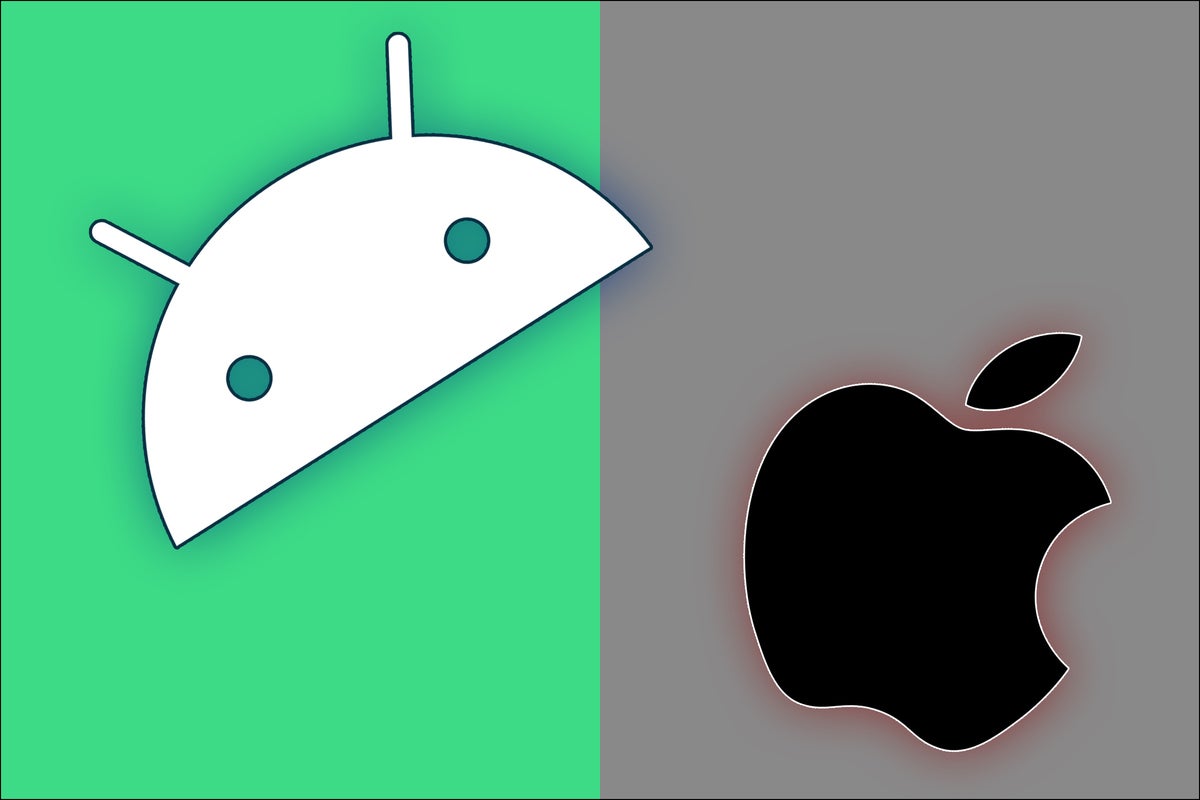Ask most Android enthusiasts for their thoughts on the eternal "iPhone vs. Android" debate, and you're bound to hear some comically common conclusions:
- Android is more advanced and ambitious, both in its software and especially in its hardware (hello, folding phones!).
- Android is more customizable and conducive to productivity, thanks to all the ways it lets you take total control of your virtual environment and make it work the way you want.
- The iPhone is bland, old-fashioned, and boring in comparison.
Apple's iOS platform certainly has its advantages, but it's tough to deny that Android is the more modern, powerful, and adventurous option (a juxtaposition expressed admirably in this recent video analysis by the ever-balanced Marques Brownlee).
And yet, talk to most typical, non-tech-inclined phone buyers — particularly here in America — and you're bound to hear a very different interpretation.
It's shaping up to be a pressing problem. And it's something that's increasingly critical for Google to address.
[Get fresh Googley insight in your inbox with my free Android Intelligence newsletter. Three things to know and try every Friday!]
The Android-Apple shift
You've seen the stats by now, right? For a while, the tides have been turning in the US and Apple's been gaining more and more of the American mobile market.
According to the number-crunching crew at Counterpoint Research, Apple currently commands just over half of all US smartphone sales, with 52% of Q2 2023 device purchases compared to Android's 48%. To be clear, this is absolutely an American phenomenon: Globally, Android represents a whopping 81% of all phone sales for that same period, according to that same set of data. But here in the States, the trends are indisputable.
And among The Youths™, the pattern appears to be even more extreme: An annual survey from an investment bank called Piper Sandler (which, as far as I can tell, has no relation to Adam) says a staggering 87% of teens now own an iPhone, with 88% anticipating an iOS device to be their next mobile gizmo. Granted, the survey includes only 5,690 people, so it isn't exactly comprehensive. But it's frequently cited as a representative sampling of current trends.
And what's even more troubling than any sheer number is the attitude that appears to be driving the data. A recent report from The Wall Street Journal says it all:
Deb Harrison lives in a house divided. The mom of teenagers, based in Hudson Valley, N.Y., says her children agree on a lot, but they cannot seem to get on the same page about their cellphones. Her youngest, Kira, 15 years old, has an Apple iPhone 11, because that’s what all her friends have. She didn’t want to be “the odd one out,” said Harrison. ...
Where does this operating-system snobbery come from? Melissa Jones, a former teacher in Lebanon, Ind., observes that, among students, it’s considered most important to own a new, up-to-date phone. And judging by the copious TikTok content that pits users of the two operating systems against each other — with Android most frequently the butt of the joke — many teens associate Androids with older technology, and older people, no matter how new the phone actually is.
Yeesh. And hold the phone — it only gets worse from there:
“You’re telling me in 2023, you still have a ’Droid?” says 20-year-old online creator Abdoul Chamberlain during a video posted in April. “You gotta be at least 50 years old.” The video goes on to say that only parents have Androids, and despite the persistent claims from Android users that features like the cameras or battery life are better on the Android than the iPhone, Chamberlain refuses to get one.
Other videos more somberly describe the experience of showing up to high school with an Android phone and being called “broke” or “medieval” by the poster’s peers. Still more describe the feeling of being the lone Android user in a group chat of iPhone owners, shamed by texts which, when rendered in Apple’s proprietary iMessage platform, appear in a revelatory bright green rather than the cool blue of messages sent between Apple devices.
Crazy what years of powerful marketing and misleading messaging can do, isn't it?
The Android image challenge
Silly as this perception may be, there's no denying it's real — here in the States, at least — and the pressure around that reality only grows more pressing for Google with every passing month.
The iMessage factor certainly seems to be a big part of it, and it's no wonder: Apple has deliberately dumbed down its iPhone messaging experience for ages in order to reinforce the perception that Android phones are somehow not capable of keeping up with its standards. The reality, of course, is quite the opposite — and ironically, it's iPhone owners who end up suffering the most from the subpar experience this manufactured stubbornness creates. But at the same time, the underlying goal of vilifying Android devices by making them seem less capable is clearly working.
(Also ironically: Google once had a massive advantage in the mobile messaging arena, and it's the company's own inability to commit to anything that got it into this pickle in the first place. But that's a whole other can of worms.)
Still, while it may be easy to blame the iMessage messaging — and while the US-centric nature of this phenomenon absolutely supports that as a leading theory to the Apple-vs.-Android perception problem — there's almost certainly more to the story.
Look, for instance, at the top-selling phones around the world, and you'll spot a very consistent trend that's been present in some form for years now. Plain and simple and without any sugar-coating, the Android devices most people are actually buying are the ones that absolutely suck.
Per a recent Counterpoint compilation of the most popular phone models of 2022, only two Android devices made the "most popular" product list: the Samsung Galaxy A13 and Galaxy A03 — phones that are typically sold through carriers for under a hundred bucks apiece.
Another list by an analysis firm called Omdia paints a similar portrait for the first half of 2023, with Samsung's Galaxy A14, Galaxy A14 5G, Galaxy A54 5G, and Galaxy A34 5G (gesundheit!) claiming four of the top 10 spots for global smartphone sales.
For those of us who live in the land of Google Pixel products or even the higher-end Samsung Galaxy gadgets, let me illuminate you on what these low-end Galaxy A-this-and-that models are all about:
They are, to use the technical term, steaming hot piles of garbage — truly terrible all-around user experiences with bloated software, subpar performance, and virtually no ongoing software support.
And when the vast majority of people in the world are associating Android with those types of devices, combined with Apple's artfully forced perception of Android being the lesser platform that can't keep up with its magical messaging standards, it's no wonder folks think Android is awful. Honestly, can you blame 'em?!
There is, however, one light at the end of this tunnel. And it's completely in Google's control.
The Google Pixel promise
For years now, I've been extolling the virtues of Google's Pixel platform and the unmatched all-around experience that side of Android has to offer.
Much as I hate to make the comparison, it really is accurate to frame the Pixel as the closest equivalent to an "iPhone-esque" arrangement on Android — with the same company responsible for the operating system making the hardware and controlling the entire end-to-end experience.
The result is a level of polish, poise, and cohesiveness you simply don't see anywhere else on Android — not to mention a glaring lack of the sort of preinstalled bloatware and confusingly redundant services device-makers like Samsung love to bake into all of their Android products. (And let's not even get started on the shady data-selling part of that equation.)
With no disrespect to anyone who genuinely enjoys Samsung's approach to Android, I've heard from countless people who have made the switch from a Galaxy phone to a Pixel over the years, and virtually every single one of 'em has sung the same tune: "Wow! I had no idea Android could be this good. I had no idea what I was missing."
That's the Android experience Google needs ordinary tech-totin' people be aware of. But when the term "Android" is associated with so much bottom-of-the-barrel, godawful garbage, it's damn-near impossible to break free from that and create a positive perception.
Subtle as they may seem, though, we're seeing some small signs of hope amidst the darkness. For a while now, Pixel sales have been steadily rising at the same time that smartphone sales in general are struggling — which, suffice it to say, is a trend worth noticing.
To wit: A June 2023 analysis shows Pixel sales experiencing a hefty 20% year-to-year growth from last summer to this year, while phone sales in general dropped by 11%. Earlier this year, another report indicated a 67% year-to-year growth for Pixels in the first quarter of 2023. Other recent quarters show annual growth for Google as high as 230 or even 380 percent, again all while overall smartphone sales have been slumping.
Mind you, the actual sales numbers are still fairly small, with Pixels accounting for a mere 4% or so of the US smartphone market (though apparently now claiming the top spot for phone sales in Japan — go figure!). But much like what we observed with Android itself way back in the day, the trends here speak volumes. And even if the figures are relatively meager for the moment, if those trends continue quarter after quarter, the bigger picture will start to shift before long.
The comparison to Android itself in the platform's early days isn't entirely parallel, of course. Android has always had the advantage of having numerous phone-makers creating a vast array of products while the Pixel is but a single device line by a single manufacturer. But still: Two- to three-digit growth quarter after quarter can only add up, especially when everyone else is struggling to sell phones at the same time.
Even so, the challenge remains the perception around Android, and that may be a tough nut for Google to crack. It's hard not to wonder if the association with the Android brand could ultimately prove to be a limiting factor for both the platform's future and the Pixel's success and if Google would do better to emphasize the Pixel as its own separate alternative — or perhaps to frame it as part of a small and very closely guarded subset of devices that receives some manner of enhanced branding to indicate their exceptional-experience status (Android Silver, anyone?).
One way or another, it's clear Google's got its work cut out for it in addressing the ever-expanding Android perception problem before it's too late. It has the answer right in front of its face, with the Pixel product line and everything around it. The question now is if it can figure out how to embrace the momentum around that and turn its small but mighty spark into a truly powerful advantage.
Psst: Got a Pixel? Any Pixel? Sign up for my free Pixel Academy e-course to uncover tons of hidden features and time-saving tricks for your phone!



























































































